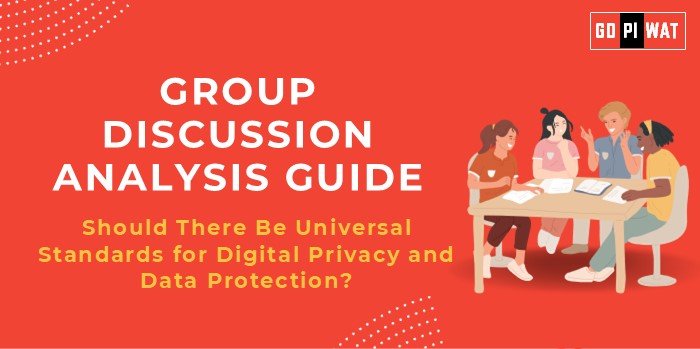📋 Group Discussion Analysis Guide
Should There Be Universal Standards for Digital Privacy and Data Protection?
🌐 Introduction to the Topic
Opening Context: As the world increasingly relies on digital platforms for communication, commerce, and governance, digital privacy and data protection have become critical global concerns. With cross-border data flows shaping modern economies, the absence of universal standards creates a fragmented, vulnerable landscape for individuals and organizations.
Topic Background: The General Data Protection Regulation (GDPR) in the EU and other national policies highlight diverse approaches to data protection. However, the growing volume of data breaches and cybersecurity threats demands a unified global approach to ensure privacy and protect against misuse.
📊 Quick Facts and Key Statistics
- 💸 Data Breaches Cost: $4.45 million is the average global cost of a data breach (IBM, 2023).
- 🌍 Global Internet Users: Over 5.5 billion people online, showcasing the importance of standardized data protection.
- ⚖️ GDPR Impact: Fines exceeding €2.5 billion since 2018 demonstrate enforcement capabilities.
- 🔐 Economic Cost: Cybercrime costs the global economy over $6 trillion annually (Cybersecurity Ventures, 2023).
🤝 Stakeholders and Their Roles
- Governments: Establish regulations and ensure compliance.
- Tech Corporations: Implement privacy-centric measures and adhere to standards.
- Civil Societies: Advocate for user rights and data security.
- International Organizations: Develop frameworks for global interoperability.
🎯 Achievements and Challenges
✅ Achievements:
- GDPR: Effective in harmonizing EU-wide data protection policies.
- Data Sovereignty Movement: Countries like India focus on localized data storage, promoting security.
- Corporate Initiatives: Tech firms, e.g., Google, offering stronger user controls.
⚠️ Challenges:
- Fragmentation: Disparate regulations impede global cooperation.
- Cybercrime Escalation: Breaches like Equifax (147 million users affected) highlight vulnerabilities.
- Ethical AI Use: Ensuring AI-driven data collection respects privacy.
🌏 Global Comparisons
- Estonia: A leader in digital privacy integration with its e-governance system.
- China: Strict control over data but criticized for lack of privacy focus.
Case Study: The AIIMS cyberattack in India (2022) underscores the need for robust standards to safeguard sensitive data.
💬 Structured Arguments for Discussion
- Supporting Stance: “Universal standards enhance trust in global digital systems, ensuring equitable privacy protections.”
- Opposing Stance: “Differences in governance and economic priorities make global standards impractical and enforceability challenging.”
- Balanced Perspective: “While universal standards offer a baseline for privacy, local adaptations are essential to address unique cultural and legal contexts.”
🚀 Effective Discussion Approaches
- Opening Approaches:
- “With 5.5 billion users online, fragmented privacy laws leave billions vulnerable to cyber threats.”
- “The GDPR fine of €1.2 billion against Meta in 2023 exemplifies the growing importance of privacy enforcement.”
- Counter-Argument Handling: “Localized approaches are necessary, but interoperability frameworks can bridge gaps while respecting sovereignty.”
📈 Strategic Analysis of Strengths and Weaknesses
- Strengths: Global trust-building, reduced compliance burdens for corporations, and enhanced user rights.
- Weaknesses: Differing national priorities, cost of implementation, and enforcement hurdles.
- Opportunities: Standardizing frameworks for AI, blockchain, and IoT.
- Threats: Geopolitical tensions and misuse of standards for surveillance.
📚 Connecting with B-School Applications
- Real-World Applications: Business students can explore case studies in data compliance, cybersecurity innovations, or international data-sharing partnerships.
- Sample Interview Questions:
- “Should India adopt GDPR-like regulations?”
- “How can global tech firms navigate diverse privacy laws?”
- Insights: Importance of understanding the economic implications of data breaches and leveraging privacy for marketing and consumer trust.


